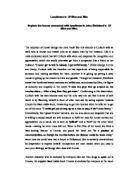Loneliness in Of Mice and Men
Explore the issues connected with loneliness in John Steinbeck's Of Mice and Men.
Loneliness is examined carefully in Of Mice and Men. In the world of itinerant ranch-hands, loneliness is an inescapable part of life and Steinbeck records this through the plot and characters in his novel. Being lonely is the lack of an emotional, mutual bond, which leads the characters to lose a sense of self-worth and dignity. This essay explores what Steinbeck discusses about loneliness in Of Mice and Men and how he uses the characters of Candy, Crooks, George, Lennie and Curley's wife to express these views.
George and Lennie are the most interesting starting point for such an exploration since they are the only two characters in the novel who are defined by their companionship rather than loneliness. George proclaims proudly to Lennie in the early pages of the novel, that itinerant ranch-hands, typical of the economic Depression in the USA in the 1930s, "are the loneliest guys in the world" but "with us [them] it ain't like that". Both George and Lennie know that their friendship gives them a future and gives their life purpose and significance. They want to own a farm where they can "live off the fatta the lan'" and rear animals; where their feeling of self-worth will not stem from gambling and prostitutes, but from their camaraderie-their importance to each other. On the other hand, other wandering workers "got no family" and they "don't belong no place." George and Lennie know that their companionship sets them apart-it makes them dignified enough to have a dream and think about putting down roots, a dream that most ranch-hands would have had at the time, but would never achieve. Other ranch-hands' remained as 'islands', their lives cut off from anybody else's.
Explore the issues connected with loneliness in John Steinbeck's Of Mice and Men.
Loneliness is examined carefully in Of Mice and Men. In the world of itinerant ranch-hands, loneliness is an inescapable part of life and Steinbeck records this through the plot and characters in his novel. Being lonely is the lack of an emotional, mutual bond, which leads the characters to lose a sense of self-worth and dignity. This essay explores what Steinbeck discusses about loneliness in Of Mice and Men and how he uses the characters of Candy, Crooks, George, Lennie and Curley's wife to express these views.
George and Lennie are the most interesting starting point for such an exploration since they are the only two characters in the novel who are defined by their companionship rather than loneliness. George proclaims proudly to Lennie in the early pages of the novel, that itinerant ranch-hands, typical of the economic Depression in the USA in the 1930s, "are the loneliest guys in the world" but "with us [them] it ain't like that". Both George and Lennie know that their friendship gives them a future and gives their life purpose and significance. They want to own a farm where they can "live off the fatta the lan'" and rear animals; where their feeling of self-worth will not stem from gambling and prostitutes, but from their camaraderie-their importance to each other. On the other hand, other wandering workers "got no family" and they "don't belong no place." George and Lennie know that their companionship sets them apart-it makes them dignified enough to have a dream and think about putting down roots, a dream that most ranch-hands would have had at the time, but would never achieve. Other ranch-hands' remained as 'islands', their lives cut off from anybody else's.






